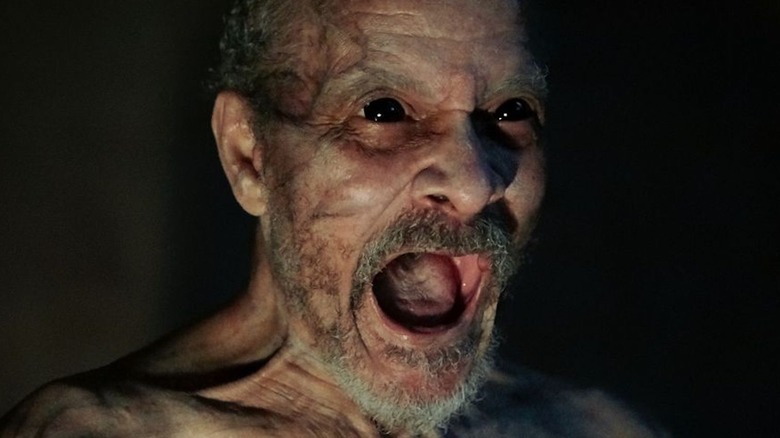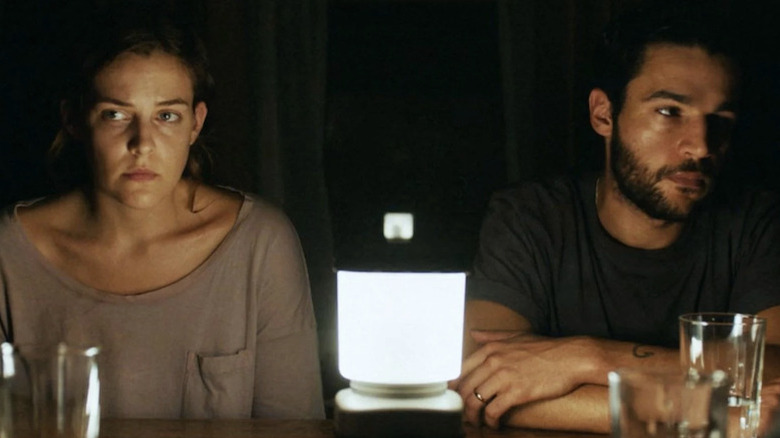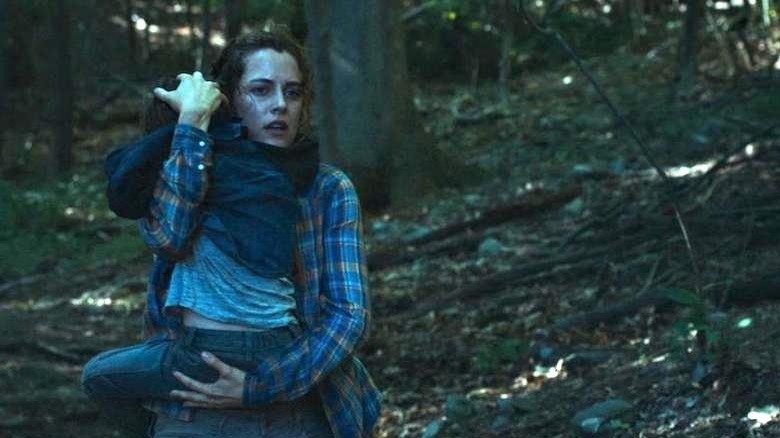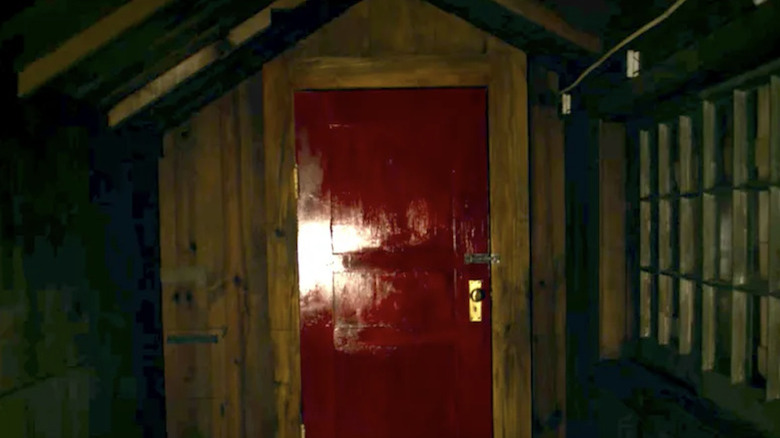The Ending Of It Comes At Night Explained
In the last decade, A24 has cemented itself as the go-to studio for directors and writers to create truly unique stories on the big screen, with a level of depth and intensity that larger studios don't typically allow for. It has become a place for creatives to really push the boundaries of different genres — and horror, in particular, has thrived under the A24 banner thanks to movies like "The Witch," "Green Room," "Hereditary," "Midsommar," and "X."
But one A24 horror flick that doesn't get as much of the spotlight is Trey Edward Shults' "It Comes at Night," which stars the likes of Joel Edgerton and Christopher Abbott. The movie sees Paul (Joel Edgerton) living in a remote forest cabin with his wife Sarah (Carmen Ejogo), and their son Travis (Kelvin Harris Jr.) as they hide away from a brutal disease which has already ravaged the rest of the world. Their quiet, reserved existence is thrown into disarray when a trio of survivors arrive searching for shelter and food. Although they work and live alongside each other peacefully for a while, fear and paranoia eventually sets in.
It's an incredibly taut horror movie, relying on suspense to keep the audience hooked, rather than the jump-a-minute approach of other blockbuster horrors. But there's also an air of ambiguity surrounding the story, because Shults' script shows how a complicated, claustrophobic situation like this can escalate from bad to worse within an instant.
In the end, the mysterious atmosphere gives way to some answers, but questions remain unresolved. Is there something in the woods? What do the nightmares mean? Who's to blame for the heartbreaking finale? Here's the end of "It Comes at Night" explained.
Paranoia comes at night
So what does the title mean?
"It Comes At Night" suggests some kind of physical or supernatural entity is literally preying on its victims during the night. Though there aren't any shambling monsters, zombies, or ghosts in "It Comes At Night," the creepy atmosphere leads audiences to expect something is hunting the two families, especially since Travis keeps drawing tall imposing figures with black eyes that just ooze creepiness. But really, what actually comes at night isn't a monster, but fear and paranoia.
Travis has several nightmares about succumbing to the mysterious plague, and they're utterly terrifying. Not only does he imagine Kim (an outsider) dripping bile down his throat, he also dreams about his grandfather, who becomes a screaming banshee while spitting the same black liquid. His visions are incredibly haunting, and they bleed into the overall paranoid atmosphere that squeezes the story. They also lead to questions. For instance, was Travis sick the entire time? Are these nightmares are a foreshadowing of things to come? Either way, he's clearly disturbed thanks to the horrors he's seen and endured in the apocalypse.
If we want to get technical — Travis' dog, Stanley, comes at night — ultimately bringing with it death and destruction from the outside world, although it's not clear who opened the door and let him inside (and yes, unfortunately, this is one of those films where the dog dies, sorry). Paul explains that Stanley is sick, and they burn the body because he clearly picks up the infection when he runs off into the woods earlier in the film. Maybe Travis really did see something in the surrounding area, after all, but the film never reveals what it might've been, though one assumes it was other people infected with the virus.
Why does Paul kill Will and his family?
Unfortunately, Stanley's death is the catalyst for the entire situation to come crashing down on both families, as Paul, Sarah, and Travis start to wonder if Will's (Christopher Abbott) son, Andrew (Griffin Robert Faulkner) is infected. And although the two families quarantine for a little while, tensions escalate between them — which leads Paul to force them out of the house. But considering the two groups are on good terms for most of the film, it seems a little harsh that his first reaction is to make them leave when they could just stay in their room.
But Paul's own paranoia is to blame for his overreaction — and it can all be traced back to a hushed conversation he has with his family, warning them that if things end with Will, Kim (Riley Keogh), and Andrew leave, there's a possibility that they'll return with a vengeance. So Paul's motivation to get rid of them with force is to make an impact enough that they won't come back. Unfortunately, it all gets out of hand when Will starts fighting back. Ultimately, Paul's protective instincts take over and he shoots Will, before also accidentally killing Andrew. If you hadn't already noticed, it's an incredibly tragic ending.
He even takes pity on Kim by executing her, because she's so distraught over the deaths of her husband and her son. Paul clearly thinks he's doing all this out of the greater good, because if they're infected then by killing them, he's saving his own family. But letting his paranoia get the better of him comes with a high price to pay, because the virus doesn't care about the greater good.
Who opened the door and infected everyone?
One of the biggest questions that audiences are left with at the end of the movie is this: Who is really responsible for infecting everyone? And no, we're not going to blame Stanley the dog for all the deaths, because that would just be mean.
The prime suspects are Travis and Andrew. A brief scene at the end shows that Travis opened the door to find the dog, but it's implied to be his final dream before he succumbs to his illness. This suggests that he's come to terms with being responsible for the deaths of Will and his family, but it could also symbolize the fact that he has escaped the claustrophobic situation thanks to his own death.
Will's son Andrew is the other suspect, because the young boy has a nightmare in Travis' grandfather's old room shortly before both families discover the open door and a dying Stanley. Sarah's the one who suggests that Andrew was sleepwalking and opened the ominous red door by accident, but there's no concrete proof that he did it, until he's seemingly infected. Of course, Kim tells her son not to show his eyes to Paul — which would confirm if he was infected or not. So, his mother being secretive about it is a little suspicious.
Really, it doesn't actually matter who infected who — because the point of "It Comes at Night" is the way that people get so caught up in blaming each other. The film's message is that hostility and distrust can be everyone's downfall in a situation like this, and that we should all have a little more compassion for one another. It's a weirdly wholesome message for a film where Joel Edgerton slaughters an entire family, but hey.



